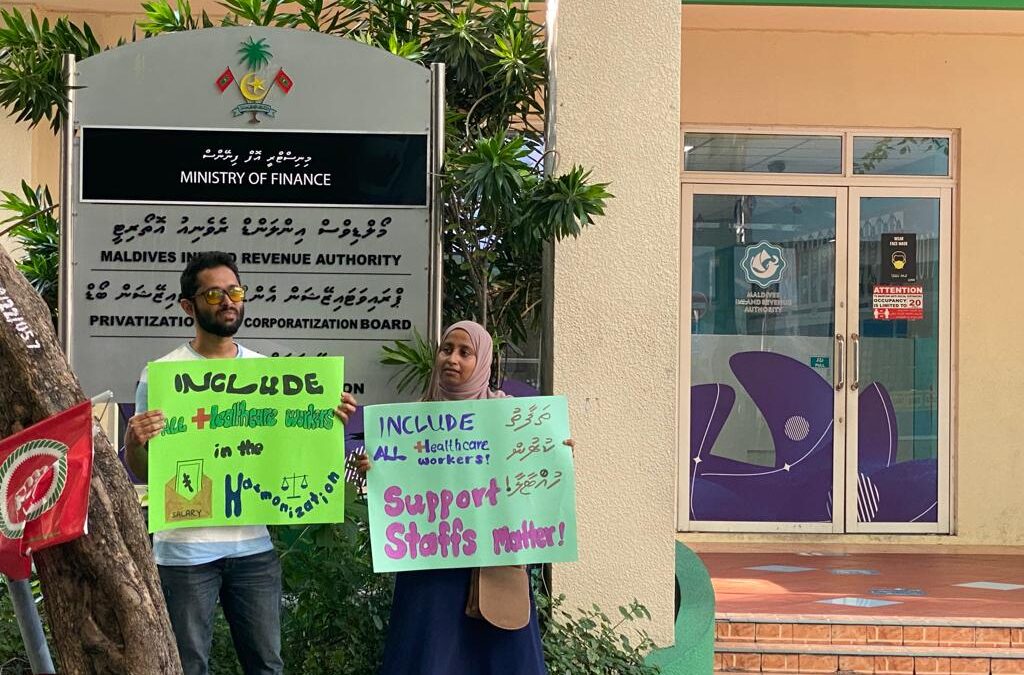
Apr 8, 2025
Health care workers working in the public sector throughout the Maldives will now receive overtime pay in full for all public holidays, resulting from a robust campaign spurred by the Maldives Health Professionals Union (MHPU).

A health care worker holds a sign stating: “Wage theft is a crime–Pay overtime wages.” Credit: MHPU
The new amendment, approved at the end of March, covers all 9,000 government health care workers and removes a 10 percent cap on salary for public holidays. Paid overtime includes all public holidays, such as Fridays, which are part of the official weekend in the Maldives Solidarity Center, an MHPU partner, has provided advocacy and organizing support.
“This recent change, achieved through the relentless efforts of many dedicated individuals, marks a significant step toward ensuring health care workers receive the compensation they rightfully deserve for their tireless commitment,” says Ramsha, a public health program officer.
Staffing shortages have meant nurses and many health care employees regularly work between 40 and 60 hours of overtime each month—all with no pay. Under the new amendment, workers will be compensated if they are assigned extra hours of work during public holidays.
The health care workers often work extra hours beyond their regular schedule, sacrificing their personal and family life. The recent amendment protects wages—- especially during public holidays—and provides additional income protections in the struggling economy.
“They were compelled to work because of shortages,” says Fathimath Zamnia, MHPU general secretary. “Many are kept on call 24/7 and some work 12 hours, with no adequate rest between the next shift.” Hours standing to care for patients resulted in young workers using pain-relief patches, undergoing spinal surgeries and often suffering from chronic illness, adversely affecting families.
“Health care workers are highly service-oriented and often make significant sacrifices,” Zimna says.
Health care workers say that while the amendment does not address all issues related to overtime, “we want to ensure that all workers are safeguarded against unpaid forced labor, as it directly impacts both patient care and life beyond work of the individual.”
Solidarity Center Builds New Strategies
Solidarity Center has played a vital role in providing training and technical assistance to partner unions, including MHPU in the Maldives. The successful overtime campaign reflects the new strategies Zimna and the union gained in both the Solidarity Center’s Global Labor Leadership Institute and Global Organizing Institute. Their new focus facilitated unions to build a grassroots structured organizing campaigns focused on strategies that educate and mobilize workers to build collective power.

“We want to ensure that all workers are safeguarded against unpaid forced labor”–Fathimath Zimna. Credit: Solidarity Center / Mollie Relihan
The public campaign included media coverage in newspapers, involving agitating workers through social media to highlight their struggles. As more workers became involved on Facebook and X (Twitter), two common platforms, more workers reached out using the union hashtag, with their friends and relatives joining.
The healthcare workforce continues to face multiple issues in their working environments, “We are dedicated to strengthening workers’ collective power and continuously striving to achieve better working conditions and improved quality of care,” Zimna says.
Bolstering Worker Wins
Bolstering fundamental democratic principles such as decent wages and safe working conditions, the Maldives Trade Union Congress (MTUC) and MPHU began a years-long struggle for passage of the Industrial Relations Act in 2024, which, with its emphasis on the protection of worker rights, unions say paves the way for economic and social progress.
“The Solidarity Center was a huge partner in the campaign in passing two very crucial [pieces of] legislation,” says Zimna. “The legal proceedings of the campaign were handled by the Public Interest Law Centre, which also was supported by the Solidarity Center. By providing technical and strategic support, Solidarity Center also assisted in conducting training sessions and running educational programs for workers.”
As the union builds the campaign around critical issues facing workers, the Industrial Relations Act provides provisions that “create an enabling environment to form unions, organize workers and achieve collective agreements across all sectors in the Maldives,” Zimna says.In addition, unions succeeded in passage of a Occupational Safety and Health bill that underscores stringent obligations for employers, emphasizing workplace safety standards, compensation frameworks and penalties for non-compliance.
“I feel this is a great win for the union workers. Our rights have been neglected for so long, but we have come so far through our work within the union,” says Shifana Ali, a medical laboratory assistant and active participant in the campaign.
Over the past five years, MHPU, a Solidarity Center partner, has received essential support in advocacy and organizing efforts.
“Workers in the Maldives often are challenged with low wages and poor working conditions,” Zimna says. “A majority of workers in Maldives are migrants, and the growing workforce often is exploited and exposed to unsafe conditions.
“The experiences that we share are similar—as with many workers around the world, the solution lies in organizing workers and building our collective power to resist, fight and win for the workers. We are strongly committed to organizing workers in the Maldives.”
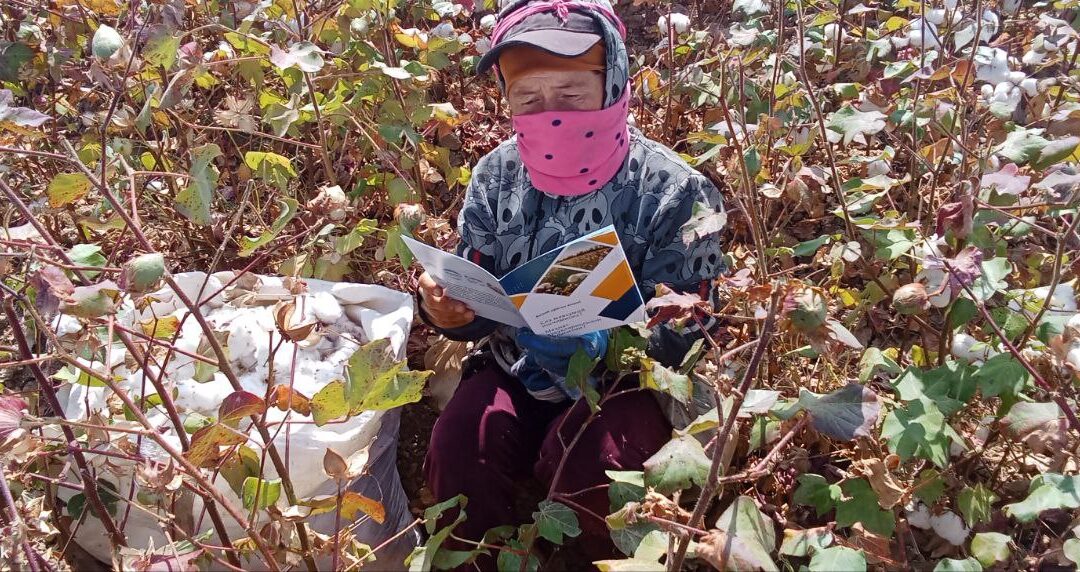
Apr 2, 2025
In Tela, Honduras, where the only major employment is palm production, Iván is one of thousands of Hondurans who depend on his job to subsist. But until Solidarity Center training strengthened the workers’ ability to form a union and gain the strength to negotiate with their employer for decent work, they endured long hours and little pay to care for themselves and their families.
“If we have better conditions here, we won’t need to leave the country,” Iván says, noting his goal is for all workers to have decent living conditions and contribute to the country’s economic development. “That’s why we organize, to have better benefits than those offered by the law.”
Without continued Department of Labor (DOL) funding, palm workers in Honduras will lose access to essential training for achieving decent working conditions, making it easier for them to stay in the country.
This week’s termination of program funding for the DOL’s Bureau of International Labor Affairs (ILAB) eliminates how the United States enforces labor standards in trade agreements, protects American workers from unfair competition and combats child labor, forced labor and exploitation around the world.
Over the years, the Solidarity Center has implemented more than a dozen ILAB-funded projects across Latin America, Africa, Asia and Eastern Europe, including in key U.S. trade partner countries like Mexico, Bangladesh, the Philippines and Honduras. Cutting these programs harms U.S. workers, weakens trade enforcement and abandons the global fight for decent work and human dignity.
The Solidarity Center received $78.3 million in DOL funding for projects over the years. They have helped hundreds of thousands of workers build a better life for themselves and their families. Here are some of the workers’ stories in those programs.
Ending Forced Labor in Uzbek Cotton Fields
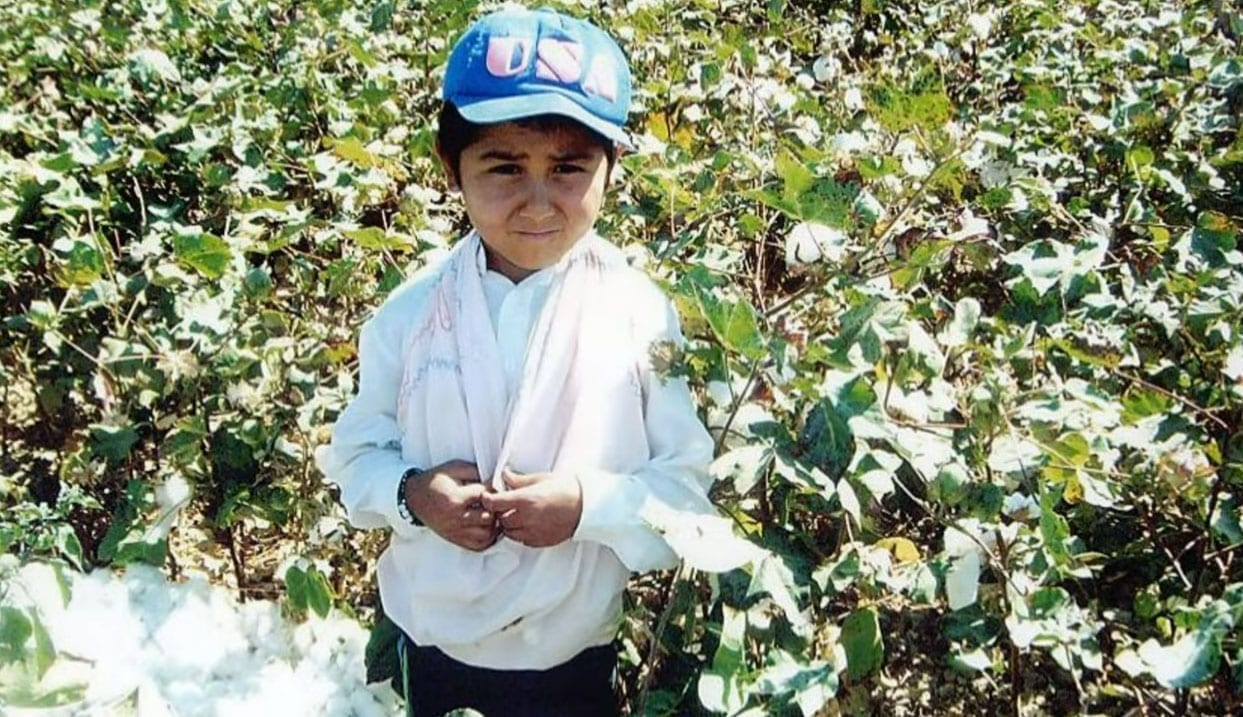 Cotton—in t-shirts, jeans and many household items—is so common, most of us do not give it a second thought. But for decades, millions of people, sometimes including children, were forcibly mobilized by the Uzbekistan government to harvest cotton for state-owned enterprises. Uzbekistan is the world’s sixth largest producer of cotton, producing over 1 million tons annually and employing around 2 million workers.
Cotton—in t-shirts, jeans and many household items—is so common, most of us do not give it a second thought. But for decades, millions of people, sometimes including children, were forcibly mobilized by the Uzbekistan government to harvest cotton for state-owned enterprises. Uzbekistan is the world’s sixth largest producer of cotton, producing over 1 million tons annually and employing around 2 million workers.
The project, now cut with the termination of DOL funding, sought to build on a 15-year effort that successfully eradicated systemic, government-imposed forced labor in Uzbekistan’s cotton supply chain. Through a multi-year global advocacy campaign led by the Cotton Campaign, of which Solidarity Center was a founding member, the government implemented reforms that, in 2021, brought an end to state-mandated forced labor.
To ensure workers who pick cotton continue working in safe conditions, the Solidarity Center signed a groundbreaking cooperative agreement last year with the government of Uzbekistan and other implementing partners to improve working conditions and prevent forced labor.
Ensuring fair labor standards protects U.S. consumers from unknowingly purchasing cotton picked as the result of forced labor, U.S. workers from competing with cotton made cheaper by exploitation and benefits workers in Uzbekistan.
A core priority of the new program would have been ensuring that all cotton sector workers have a written employment contract with enforceable work conditions. Employment contracts ensuring workers receive decent wages in safe conditions are vital, yet absent in many agricultural supply chains. This project aimed to both ensure the reforms to end forced labor in Uzbekistan are durable and help establish Uzbekistan as an alternative sourcing option to forced-labor-produced cotton from other countries.
Better Wages Benefit Mexico, U.S.
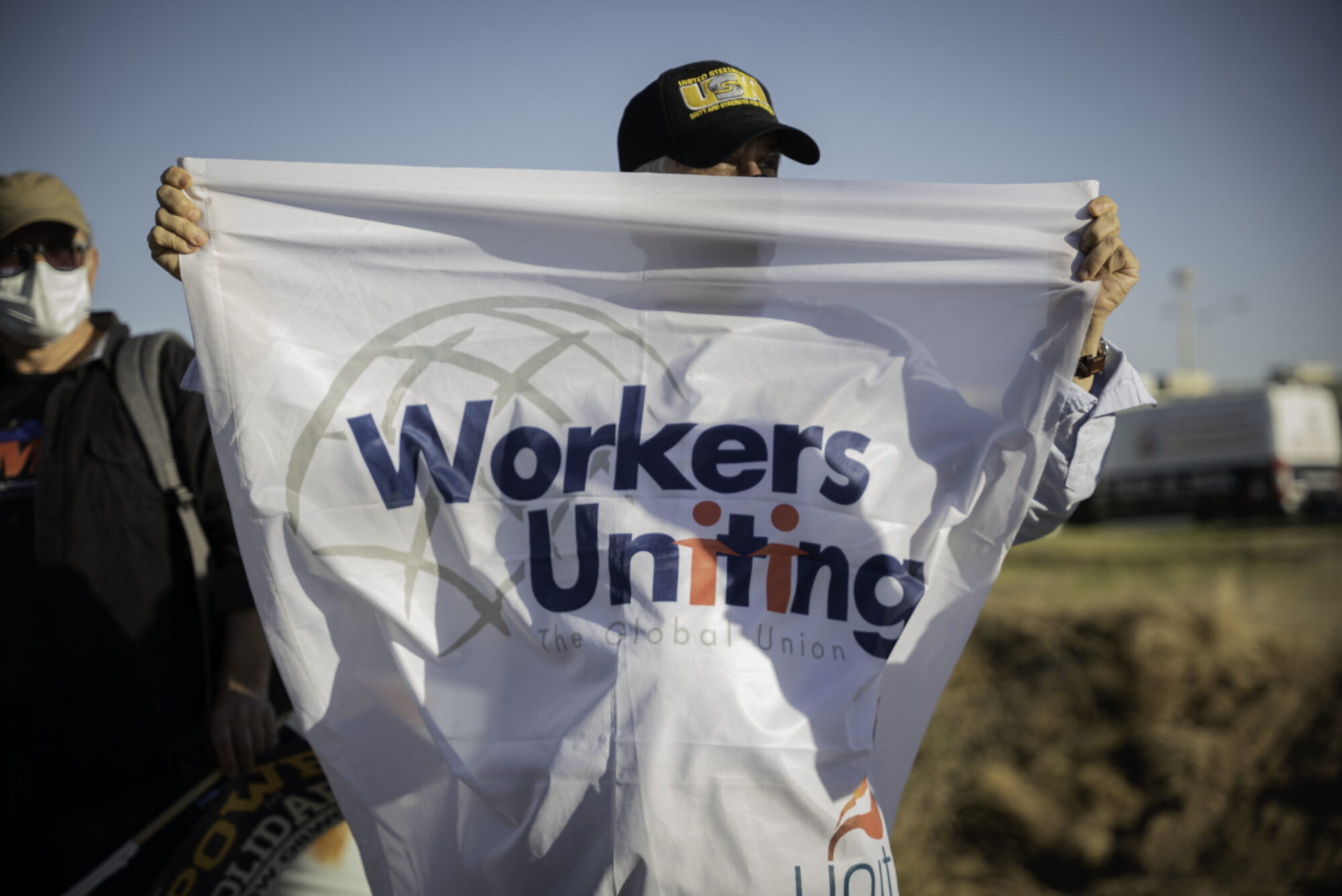
Credit: Arturo Left
In Silao, Mexico, Maria Alejandra Morales Reynoso painted auto parts for years alongside other auto plant workers forced to work double shifts with few breaks, even for the bathroom. Through Solidarity Center training and support, Morales and thousands of workers in Mexico formed an independent union, voting out a corporate-supported union that did not operate in their interest.
The union victory “gave people hope, hope that it was possible to represent workers freely,” she says. “We proved it’s possible to get organized and to fight for our rights and to leave behind the fear that we’re going to lose our jobs.”
The ability to improve their employment sparked momentum among other workers, and bolstered the ability of women to take a role in their jobs, as did Morales, now general secretary of SINTTIA, the union workers voted to form.
A reduction in the wage gap between Mexico and the United States, through authentic and transparent collective bargaining, benefits workers in both countries—by improving the wages of Mexico’s workers and disincentivizing companies from relocating from the U.S.to Mexico to exploit artificially low wages.
Over its 25 years of work in Mexico, especially since the enactment of the United States-Mexico-Canada Agreement (USMCA) and its mechanisms for labor rights enforcement, the Solidarity Center’s efforts have benefited more than 42,000 Mexican workers through USMCA resolutions upholding their rights to freedom of association and collective bargaining and obtained over $6 million in back pay and benefits.
In one case, workers at an auto plant in San Luis Potosí won a 30 percent wage increase through a USMCA ruling.
An informed, empowered, and effective agreement across North America is crucial to counter efforts to undermine the promise of shared prosperity for workers in North America. The termination of DOL funding will negatively impact workers in Mexico and the United States.
Decent Wages for 3 Million+ Mine Workers
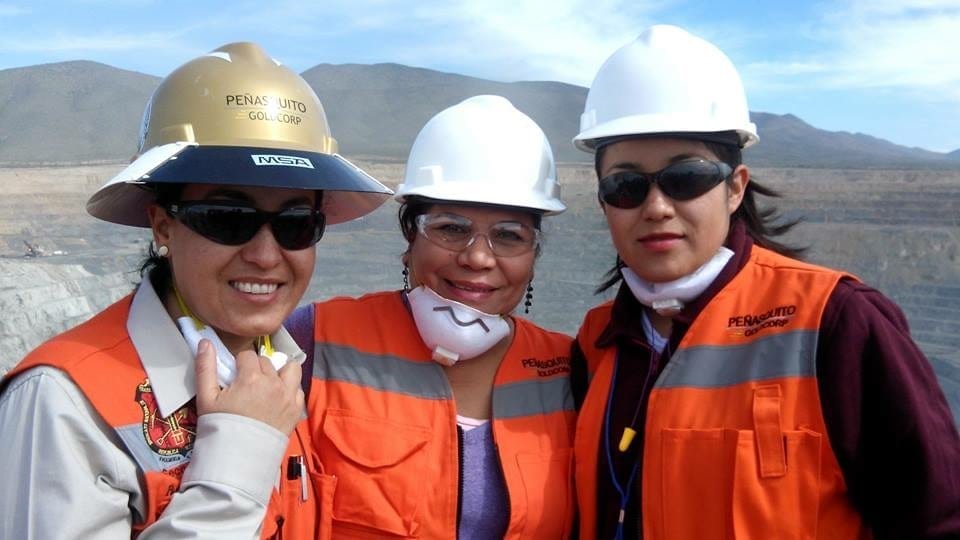
Ruth Adriana Lopez Patiño, Los Mineros, Julia Quiñonez, CFO, and Mariela Sanchez Casas, Los Mineros, all founders of the “Mineras de Acero” (Women Miners of Steel) training program, participate in a tour of a gold mine during a training in February 2015 on gender equality and women’s leadership. Credit: Los Mineros
In Mexico, where Los Mineros represents more than three million mine workers, the Solidarity Center assisted the union in successfully utilizing the USMCA’s labor instrument (Rapid Response Labor Mechanism) in 2022 to achieve union representation and successfully negotiate a strong bargaining agreement with a 15 percent wage increase.
“Thanks to technical assistance provided by the Solidarity Center funded by DOL/ILAB, we were able to use the Rapid Response Mechanism—a tool that helped us achieve justice,” says Imelda Guadalupe Jiménez Méndez, Los Mineros, secretary of political affairs. “Today our contract is 60 percent more beneficial to the workers thanks to authentic collective bargaining.”
Although the Mexican Supreme Court ruled in favor of the mine workers in 2019, it was only through the assistance of the Solidarity Center engaging in the USMCA that Los Mineros successfully negotiated a groundbreaking salary increase and significantly improved working conditions.
Mine workers in Mexico benefited from key Solidarity Center support. Shutting down Solidarity Center funding for the programs jeopardizes life-changing gains in workers’ wages, benefits and conditions and increases pressure on U.S. workers who must compete with low wages in Mexico.
Safeguarding Job Safety and Health
“Pure drinking water, a first-aid box is mandatory at our workplace, as well as women should be paid like as male co-workers,” says one woman who works at a construction site in Bangladesh.
Basic needs—fresh water, medical supplies—and wages to support her family are now accessible through Solidarity Center training that enabled her union leaders to develop a list that included crucial workplace safety and health protections and successfully negotiate to achieve those goals. In a highly competitive sector, where employers can treat workers as dispensable, such lists are essential tools that workers at a grassroots level can use to raise key concerns.
However, DOL’s termination of grant funding means thousands of construction workers in Bangladesh will not have the impact of basic workplace safety and health protections and will have little ability to receive decent wages.
These are only a few examples of Solidarity Center has benefited workers and their communities through DOL funding. Its termination will silence these efforts and undermine U.S. commitments to American workers and workers worldwide.
Halting Workplace Danger
In the electronics industry in Malaysia, the seventh largest exporter of electrical and electronics products in the world, workers producing the semiconductors used to power a range of consumer products endure hazardous conditions and lack job safety and health protections. They often face hazardous conditions, such as exposure to toxic chemicals, which can cause detrimental health effects, including cancers, respiratory issues, and even reproductive harm, including fertility problems and hazards for pregnant women. Often, they are targets of forced labor.
A new Solidarity Center project, which began in 2024, sought to improve occupational safety and health standards and address workers’ access to social benefits such as social security, compensation for injuries, health care and other labor protections. Many of the workers travel from other countries such as Bangladesh, Nepal, Indonesia, Myanmar and the Philippines and face additional challenges in the workplace.
Solidarity Center training, funded by the DOL, sought to strengthen workers’ ability to take part in their workplace and their union and hold leadership positions to promote safe and healthy work environments by building strong and inclusive unions to effectively address OSH in the workplace. Solidarity Center sought to increase engagement by workers and worker organizations with government officials and employers to negotiate, address, resolve and prevent OSH abuses in the workplace through collective bargaining.
The programs also aim to level the playing field for workers in the United States by ensuring workers around the world are not exploited and abused in the frequent attempts by employers and governments to skirt the law in countries such as those in Asia. But the funding for the Solidarity Center program to address dangerous conditions for workers producing electronics in Malaysia, as with all DOL-funded programs in countries throughout the world, have been terminated.
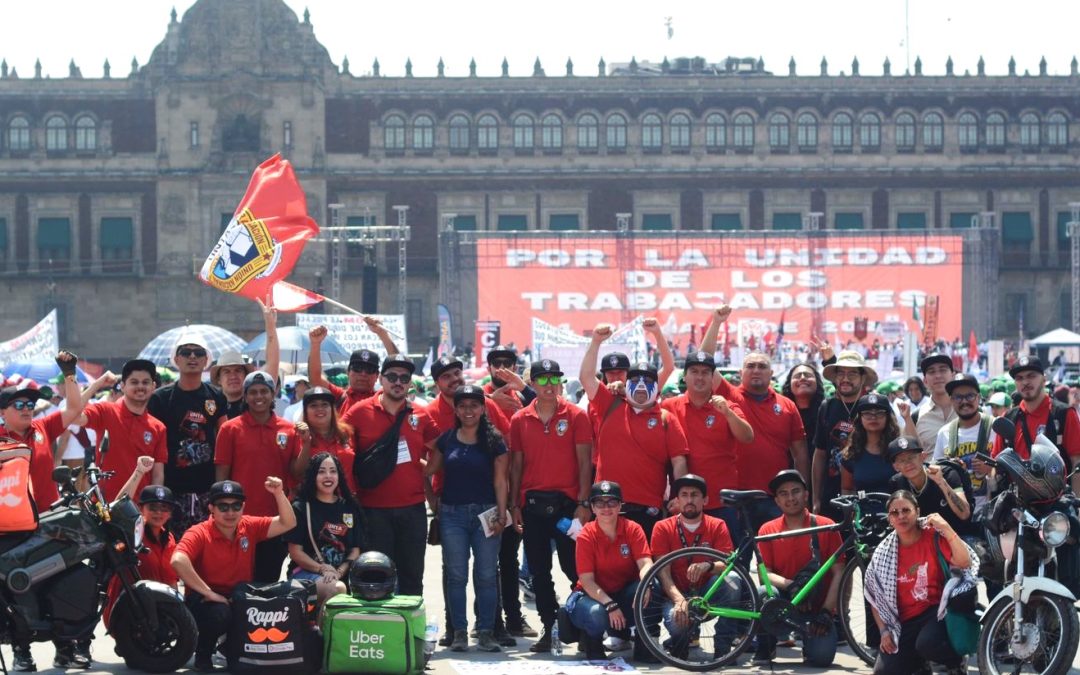
Jan 6, 2025
App-based delivery drivers and drivers paid the minimum wage in Mexico celebrated the holidays with new legislative reform that recognizes them as workers and ensures their access to social security, accident insurance, pensions, maternity leave, company profits and a Christmas (holiday) bonus.
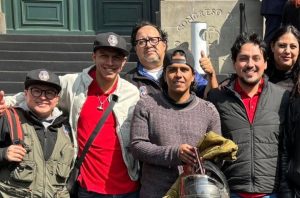
App-based delivery drivers and drivers paid the minimum wage in Mexico are now recognized as workers and have access to social security, accident insurance, pensions, maternity leave and company profits. Credit: UNTA
The law, introduced by Mexico’s President Claudia Sheinbaum on October 15, passed with full approval by the lower house and the Senate, which voted in December. It recognizes gig workers as employees, entitled to worker benefits and protections under Mexican law.
Some 658,000 workers are employed across Mexico on digital platforms, with 41 percent earning above the minimum wage. The National Union of App Workers (Unión Nacional de Trabajadores por Aplicación, UNTA) campaigned for the new law, taking a key role in urging its passage. Because of its advocacy, up to 2.5 million workers, according to Mexico’s government, will now have access to important social protections and benefits.
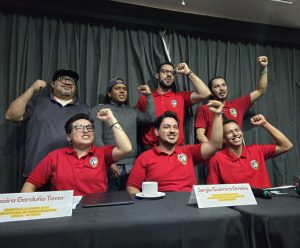
Mexico app-based drivers took part in a media conference as part of the campaign to pass a landmark law covering platform workers. Credit: Rubén Piña
In a media conference with its partner, the Solidarity Center, UNTA members expressed support for the regulation and also highlighted areas for improvement, such as recognizing connection time as part of total work hours. UNTA is an affiliate of the International Transport Workers’ Federation (ITF) and part of its Latin American Platform Workers’ Network.
“This reform reaffirms what we have been saying for years: We are workers,” says the General Secretary of UNTA, Sergio Guerrero. “And after years of hard struggle, this historic achievement contributes to the dignity of digital workers in Mexico, Latin America and the world.”
Ensuring Decent Work for App-Based Jobs
With few formal economy jobs available, workers worldwide are turning to the platform-based economy to support themselves and their families. While the rapid increase in app-based jobs offers millions of workers additional avenues to earn money, it also creates new opportunities for employer exploitation through low wages, lack of health care and an absence of job safety.
According to the International Labor Organization (ILO), digital platforms have created new opportunities and blurred the labor relationship between employers and workers. As a result, the digital platform work model does not adhere to standards of decent work, or fundamental ILO treaties (“conventions”), especially those on freedom of association, collective bargaining and discrimination in employment and occupation. Digital platform workers often earn low wages and lack access to social protections, minimum wage protections, employment benefits such as paid vacation and opportunities for collective bargaining.
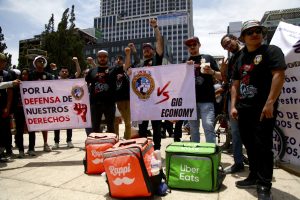
App-based drivers in Mexico waged multiple rallies in support of decent work. Credit: Iván Stephens
As in Mexico, app-based workers who drive motorbikes, bicycles and cars to deliver food and transport passengers receive no paid sick leave or vacation. They work long hours and rush between deliveries, risking their safety because if they do not, the app—via the company—punishes them by lowering pay. When drivers or deliverers are injured, they receive no compensation from their employers.
In Mexico, the law now addresses such issues, ensuring that workers have the flexibility to define their own working hours and requiring the employer—such as Didi, Rappi and Uber—to register workers in the nation’s social security program, covering occupational risks and providing access to health and housing benefits. Companies are required to register contracts with the government, which must detail working hours, income and algorithmic management rules.
Further addressing what workers describe as the company’s frequent abuse through algorithms, the law prohibits companies from charging for the use of the platform and obliges them to issue detailed payment receipts and respect digital disconnection outside working hours. It prohibits companies from manipulating workers’ income to avoid their classification as dependent on employers of digital platforms and blocks the collection of fees from workers for registration, use, separation or similar concepts related to the employment relationship.
In Mexico, digital companies now must guarantee the publication of algorithmic management policies and may not manipulate income to distort the employment relationship or carry out contractual simulations. The law also prohibits withholding of workers’ wages. The new law in Mexico is one of the most progressive in the world in regulating work through digital platforms, guaranteeing fundamental labor rights.
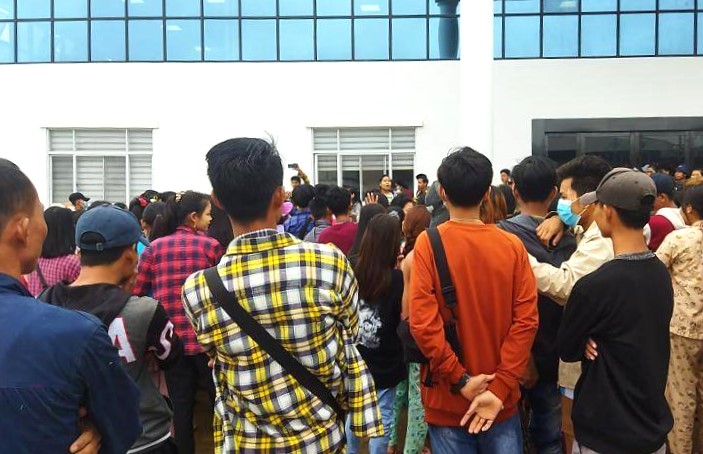
Nov 27, 2024
Some 500 factory workers are on strike in Yangon, Myanmar, demanding a return to the job for colleagues who joined them in seeking decent wages and working hours and a workplace free from violence and abuse. Since the strike began in November, more than 50 workers have been fired. On November 22, the company brought in a group of 20 agents from the repressive military junta to threaten workers with physical violence to break the strike.
The members of the Federation of General Workers of Myanmar (FGWM) at the Charis Sculpture factory went on strike in November after the employer did not comply with the terms of a new contract negotiated in July.
The Hong Kong-owned Wise Unicorn Industrial Ltd., owner of Charis Sculpture, has an estimated annual revenue between $10 million and $50 million. Yet in October, when workers protested the employer’s refusal to pay overtime as promised, workers described being followed out of the factory, with two physically attacked.
After the workers went on strike inside the factory November 6 and boosted their list of demands to include dismissal of the director who they say assaulted two workers, the company fired 13 workers, including strike leaders.
“He dragged me and then pushed me with force. I fell down,” one worker told the union. (Names are not used to protect workers’ privacy.)
According to workers, the company says the workers were dismissed for violating the employment contract and “will be dealt with by existing law,” which workers say is an unlawful dismissal.
By November 11, workers were denied entry to the factory and nearly 350 workers remain outside on strike.
Standing Strong Despite Danger
Since the February 2021 military coup, thousands of people have been killed and many more imprisoned, with union leaders especially targeted. Workers—women in particular—took an early lead in the protests against the regime, with the country’s 450,000 garment workers especially active in organizing civil disobedience actions and shutting down factories.
Protests against low wages and poor working conditions remain risky. Yet workers at Charis, a manufacturer of cold-cast bronze, fine porcelain and alloy statues for export to Europe and the United States, are standing strong for their demands. They seek to receive family-supporting pay, including a daily wage of 9,000 Myanmar kyats ($4.28), up from 7,800 kyats ($3.71).
With overtime pay essential for basic support, they call for a 2,000 Myanmar kyats (.98 cents) per hour overtime wage, from the current 1,700 (.81 cents). The workers say many need overtime but the employer does not select them—and overtime pay is “important for workers because the basic wage is not enough,” said one worker.
Women workers especially face physical and verbal harassment, according to the union, which is seeking safe workplace conditions, an end to verbal and physical abuse and an environment with suitable temperature. They also are seeking employer-paid medical care and an end to wage cuts when workers take leave.
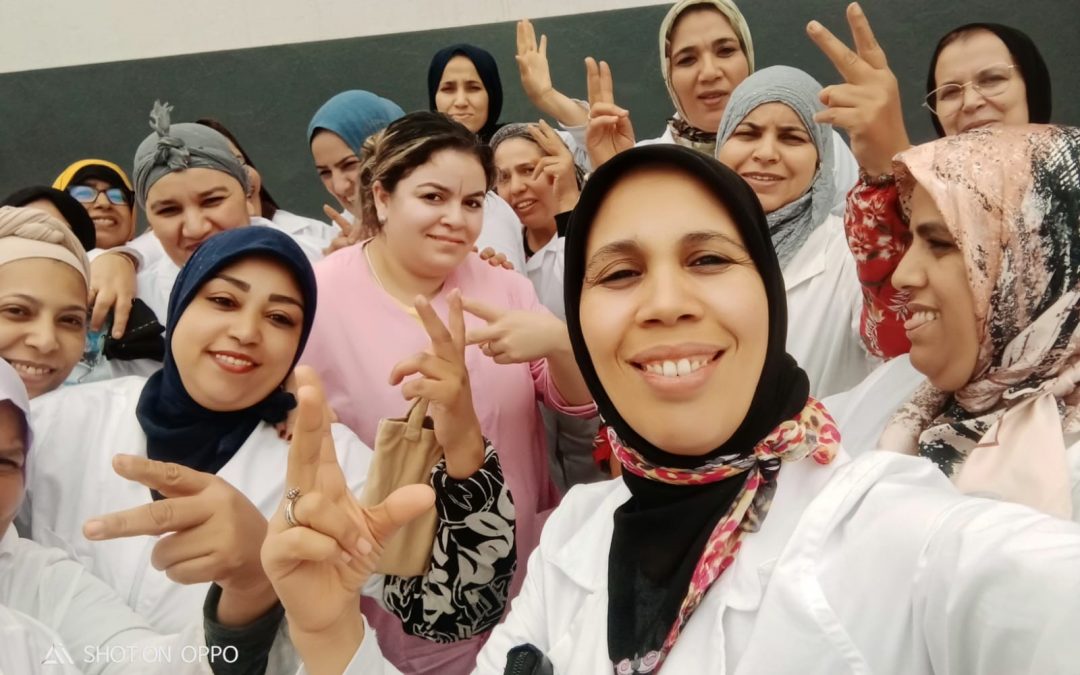
Nov 15, 2024
Nearly 2,000 workers at textile factories in Casablanca, Morocco, now can receive decent pay, health care protection and a voice on the job after joining the Moroccan Workers’ Union (UMT) and the federation of textile workers.
“We joined the union primarily to preserve our dignity, which some managers have trampled on,” said one worker, who voted for the union. (Names are not used to protect workers’ privacy.)
All 605 workers in three factories in Casablanca and the majority of the more than 1,000 workers in four additional factories in the area’s large textile industry joined the union.
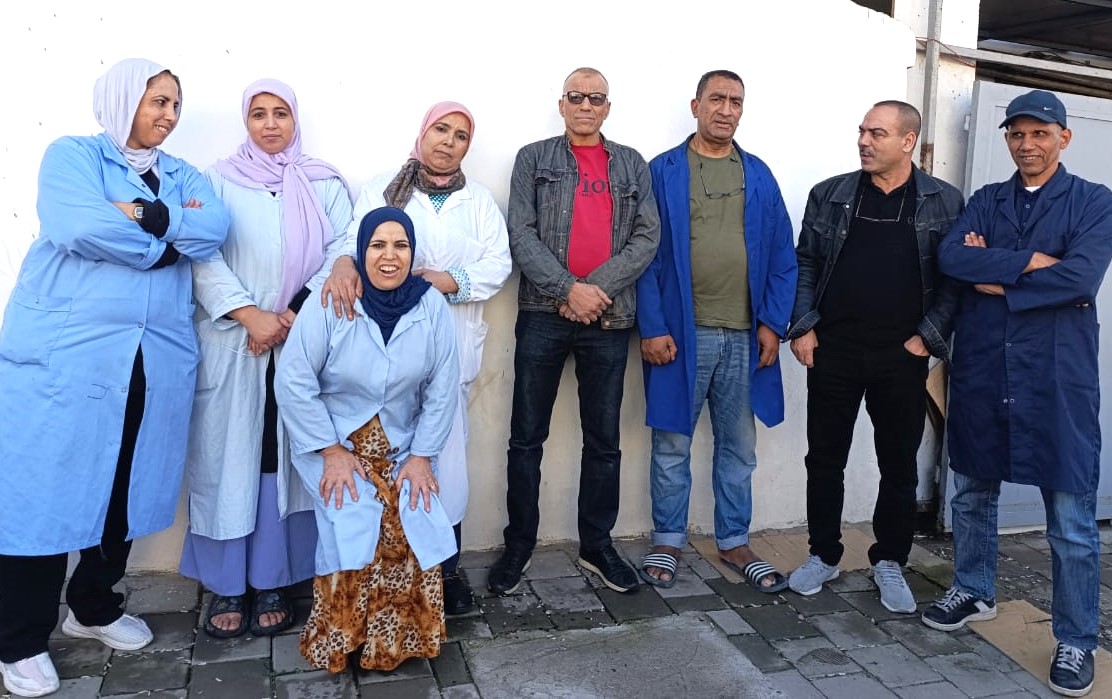
With a union, workers at textile factories are able to address workplace safety and GBVH. Credit: Hicham Ahmaddouh
Without a union, said one worker, “we couldn’t find solutions to our issues or secure our legal rights, which the company has neglected for more than five years.”
Workers at the leather, textiles, and ready-made garment factories are involved in leather production, sewing, dyeing, supplies and garment manufacturing. They say they often were not paid wages, and received insufficient compensation when often required to work overtime—or engage in fewer hours than specified by the government.
“Wage payments are often delayed, and we only receive them after striking and protesting,” one worker stated when describing conditions before the union representation.
Another worker described being “required to work up to 240 hours a month instead of the legal 191, which should qualify as overtime, yet we receive no compensation.”
Developing Outreach
Achieving success in mobilizing and assisting textile workers to form unions was part of a two-year campaign involving Solidarity Center support in providing data and analysis of key employers, supply chains and other information.
Together with the UMT, the Solidarity Center trained a team led by two women and one man to head up the organizing drive. Over the past year, the team conducted one-on-one outreach at the factories, located in a difficult to access industrial zone. They met with company officials, organized offsite outreach meetings and collected worker stories about their needs and challenges in accessing their fundamental rights.
The outreach effort is essential for expanding the union’s efforts to broaden worker rights.
“Organizing textile workers is crucial to strengthening the union’s capacity to advocate for workers’ rights, secure demands and build solidarity within the Moroccan Labor Union and the National Union of Textile, Leather, and Ready-Made Garment Workers,” said Al-Arabi Hamouk, general secretary of the National Federation of Textile, Leather and Ready-Made Garment Workers.
Textile workers sought improved occupational health and safety in the factories and wanted to ensure the companies’ adherence to labor laws and payment to the country’s social protection fund
“Since 2023, we have been deprived of health coverage because the company hasn’t paid the required contributions, even though they are deducted from our wages,” one worker said.
By forming a union, abuses such as violence and harassment could be addressed, according to a factory worker.
She said in the past, workers suffered “from verbal and sexual harassment by some managers, as well as arbitrary individual and collective dismissals when demand decreases or when we ask for our legal rights.”
“The Solidarity Center played a critical role in the success of the campaign within the textile sector,” said Hamouk. “The organizing team demonstrated the ability to strategize, and address challenges.”
Assisting textile workers in forming unions moves forward their ability to achieve decent wages, safe workplaces and essential health care coverage—and advances their democratic rights to freely form unions.
Said one union member: “We achieved dignity and the freedom to associate, which was previously denied.”





 Cotton—in t-shirts, jeans and many household items—is so common, most of us do not give it a second thought. But for decades, millions of people, sometimes including children, were forcibly mobilized by the Uzbekistan government to harvest cotton for state-owned enterprises. Uzbekistan is the world’s sixth largest producer of cotton, producing over 1 million tons annually and employing around 2 million workers.
Cotton—in t-shirts, jeans and many household items—is so common, most of us do not give it a second thought. But for decades, millions of people, sometimes including children, were forcibly mobilized by the Uzbekistan government to harvest cotton for state-owned enterprises. Uzbekistan is the world’s sixth largest producer of cotton, producing over 1 million tons annually and employing around 2 million workers.







